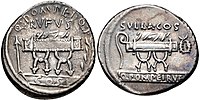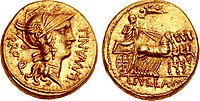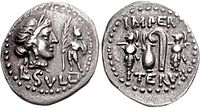reader is referred to the Dict. of Antiq. art. Leges Corneliae.
IV. Laws relating to the Improvement of public Morals — Of these we have very little information. One of them was a Lex Sumtuaria, which enacted that not more than a certain sum of money should be spent upon entertainments, and also restrained extravagance in funerals, (Gell. ii. 24; Macrob. Sat. ii. 13; Plut. Sull. 35). There was likewise a law of Sulla respecting marriage (Plut. l. c.; comp. Lyc. c. Sull. 3), the provisions of which are quite unknown, as it was probably abrogated by the Julian law.
The most important modern works on Sulla's legislation are — Vockostaert, De L. Cornelio Sulla legislatore, Lugd. Bat. 1816; Zachariae, L. Cornelius Sulla, &c., Heidelb. 1834, 2 vols., the second volume of which treats of the legislation; Wittich, De Reipublicae Romanae ea forma, qua L. Cornelius Sulla totam rem Romanam commutavit, Lips. 1834; Ramshorn, De Reip. Rom. ea forma, qua L. C. S. totam rem Rom. commutavit. Lips. 1835; Göttling, Geschichte der Römischen Staatsverfassung, pp. 459 — 474; Drumann, Geschichte Roms, vol. ii. pp. 478—494.
There are several coins of the dictator Sulla, a few specimens of which are annexed. The first coin contains on the obverse the head of the dictator, and on the reverse that of his colleague in his first consulship, Q. Pompeius Rufus. The coin was probably struck by the son of Q. Pompeius Rufus, who was tribune of the plebs in b. c. 52 [Pompeius, No. 9], in honour of his grandfather and father. The second coin was also probably struck by the tribune of b. c. 52. The third and fourth coins were struck in the lifetime of the dictator. The third has on the obverse the head of Pallas, with manli. proq., and on the reverse Sulla in a quadriga, with l. sulla imp., probably with reference to his splendid triumph over Mithridates. The fourth coin has on the obverse the head of Venus, before which Cupid stands holding in his hand the branch of a palm tree, and on the reverse a guttus and a lituus between two trophies, with imper. iteru(m). The head of Venus is placed on the obverse, because Sulla attributed much of his success to the protection of this goddess. Thus we are told by Plutarch (Sull. 34) that when he wrote to Greeks he called himself Epaphroditus, or the favourite of Aphrodite or Venus, and also that he inscribed on his trophies the names of Mars and Victorv, and Venus (Sull. 19). (Comp. Eckhel, vol. v. pp. 190, 191.)
6. Cornelius Sulla, a son of the dictator by his fourth wife Caecilia Metella, died in the lifetime of his father. (Senec. Cons, ad Marc. 12; Plut. Sull. 37.)
7. Faustus Cornelius Sulla, a son of the dictator by his fourth wife Caecilia Metella, and a twin brother of Fausta, was born not long before b. c. 88, the year in which his father obtained his first consulship. He and his sister received the names of Faustus and Fausta respectively on account of the good fortune of their father. (Plut. Sull. 22, 34, 37.) At the death of his father in b. c. 78, Faustus and his sister were left under the guardianship of L. Lucullus. The enemies of Sulla's constitution constantly threatened Faustus with a prosecution to compel him to restore the public money which his father had received or taken out of the treasury; but the senate always offered a strong opposition to such an investigation. When the attempt was renewed in b. c. 66 by one of the tribunes, Cicero, who was then praetor, spoke against the proposal. (Ascon. in Cornel. p. 72, ed Orelli; Cic. pro Cluent. 34, de Leg. Agr. i. 4.) Soon after this Faustus accompanied Pompey into Asia, and was the first who mounted the walls of the temple of Jerusalem in b. c. 63, for which exploit he was richly rewarded. (Joseph. Ant. xiv. 4. §4, B. J. i. 7. §4.) In b. c. 60 he exhibited the gladiatorial games which his father in his last will had enjoined upon him, and at the same time he treated the people in the most sumptuous manner. In b. c. 54 he was quaestor, having been elected augur a few years before. In b. c. 52 he received from the senate the commission to rebuild the Curia Hostilia, which had been burnt down in the tumults following the murder of Clodius, and which was henceforward to be called the Curia Cornelia, in honour of Faustus and his father. The breaking out of the civil war prevented him from obtaining any of the higher dignities of the state. As the son of the dictator Sulla, and the son-in-law of Pompey, whose daughter he had married, he joined the aristocratical party. At the beginning of b. c. 49, Pompey wished to send him to Mauritania with the title of propraetor, but was prevented by Philippus, tribune of the plebs. He crossed over to Greece with Pompey, was present at the battle of Pharsalia, and subsequently joined the leaders of his party in Africa. After the battle of Thapsus, in b. c. 46, he attempted to escape into Mauritania, with the intention of sailing to Spain,




